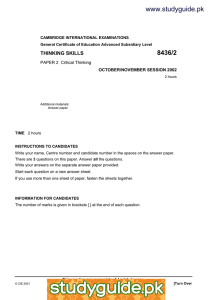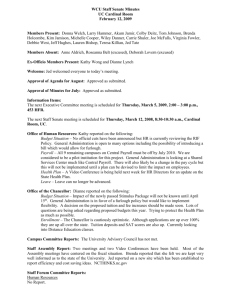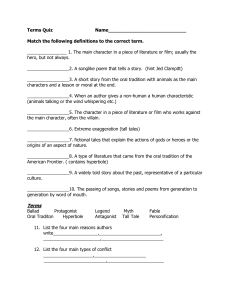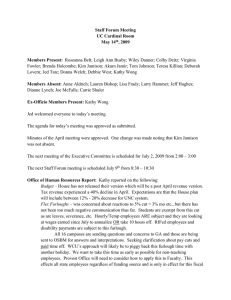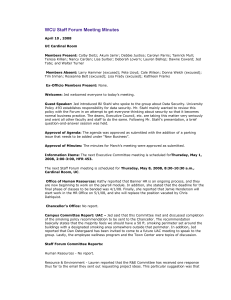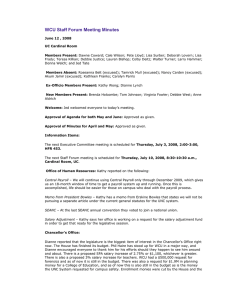8436/2 THINKING SKILLS www.XtremePapers.com PAPER 2 Critical Thinking
advertisement
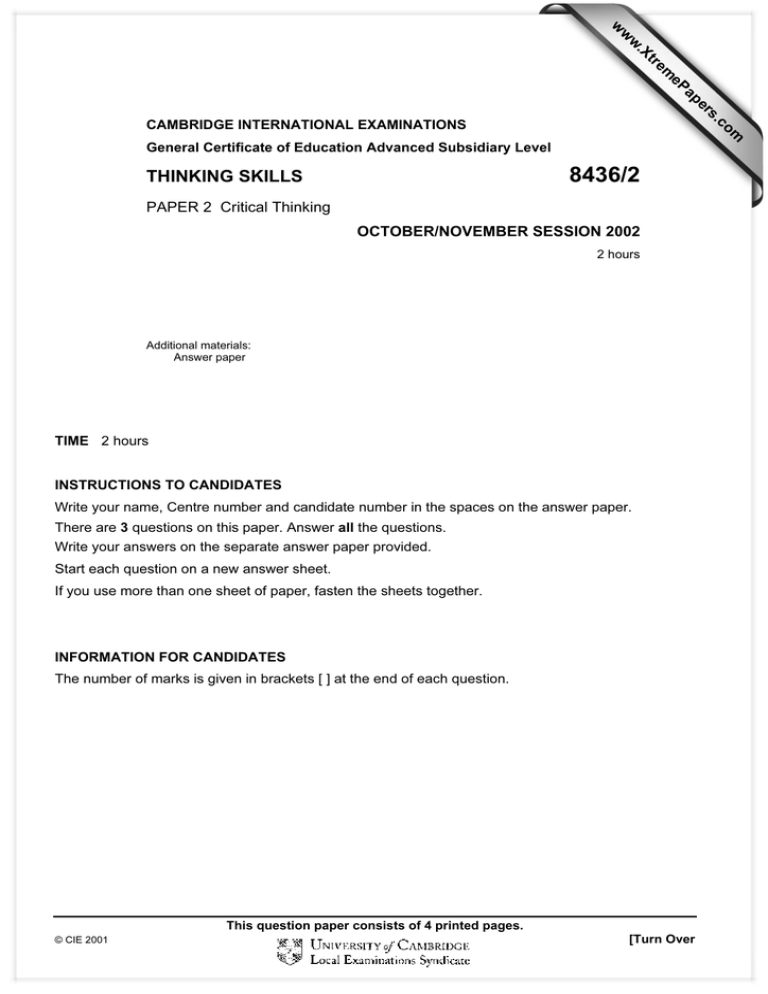
w w ap eP m e tr .X w om .c s er CAMBRIDGE INTERNATIONAL EXAMINATIONS General Certificate of Education Advanced Subsidiary Level 8436/2 THINKING SKILLS PAPER 2 Critical Thinking OCTOBER/NOVEMBER SESSION 2002 2 hours Additional materials: Answer paper TIME 2 hours INSTRUCTIONS TO CANDIDATES Write your name, Centre number and candidate number in the spaces on the answer paper. There are 3 questions on this paper. Answer all the questions. Write your answers on the separate answer paper provided. Start each question on a new answer sheet. If you use more than one sheet of paper, fasten the sheets together. INFORMATION FOR CANDIDATES The number of marks is given in brackets [ ] at the end of each question. This question paper consists of 4 printed pages. © CIE 2001 [Turn Over 2 1 Study the scenario and answer the question that follows. During the mid-morning break, there was a fight in the school playground involving boys from two rival gangs. Hearing the disturbance, Mr. Wolf, a teacher, ran round the corner from another part of the playground, expecting to find that the major culprit was Jed, who had often been in trouble for provoking others. But Jed was not there. A boy from the other gang - Rico - said that Jed had started the fight by knocking him (Rico) over then kicking him as he lay on the ground. He also said that Jed then ran off, leaving the rest of his gang to continue the fight. Rico’s gang supported this statement. The other four members of Jed’s gang said that Jed had never been there, because he was still inside the school building, finishing some work for the mathematics teacher. They all said that the fight was started by the other gang attacking them. All of the children in the playground who were not members of the two gangs said they did not see who started the fight, and they did not remember seeing Jed there. Mr Square, the mathematics teacher, confirmed that he told Jed to stay in the classroom to finish work which he had failed to complete at home. However, Mr Square left the classroom during the break, telling Jed that he must stay there and that he (Mr Square) would be gone for two minutes. He said that Jed was in the classroom when he left at 10.50, and was there when he returned at 10.58. The time at which Mr Wolf reached the fighting gangs was 10.55. It would have taken Jed one minute to walk out to the playground. He would have had to pass the open door of the school secretary’s office. The secretary, whose chair was facing the door, said she neither saw nor heard anyone walking past between 10.50 and 11.00. Jed denied leaving the classroom. He had recently been warned that if he caused any more fights he would be removed from the school football team, and Rico would take his place. Football was Jed’s favourite activity, and his behaviour had improved greatly since the warning. The question you have to consider is this:How likely is it that Jed started the fight? Critically consider all the evidence given above. Take into account the credibility of any witnesses, and consider how acceptable their statements are. [15 marks] 3 2 Read the passage and answer the questions which follow. (Note that these questions are about reasoning and, therefore, you do not need to have seen Gladiator.) Last year’s Oscars award for Best Film to Gladiator has led many critics and ordinary film-goers to finally dismiss the whole Oscar circus as a cheap and cynical piece of Hollywood selfpromotion. And they are right. The so-called ‘Academy’ which hands out the coveted Oscars is deeply flawed, both in its objectives and in its selection procedures. It is time for the film industry to make a stand and turn its back on the Oscars once and for all. Gladiator, was a big film, an epic, certainly a masterpiece of cinema technology, a feast of special effects, a spectacle. It was exciting, absorbing, emotive, fun (in a bloodthirsty fashion), actionpacked – all those things and more. But what it was not was ‘best’, in any sense of the word except that of extravagance or box-office success. When it comes to choosing the best in any art form, these are not the criteria we should be looking for, at least not to the exclusion of less glamorous qualities like fine acting, sensitivity, historical accuracy, thought-provoking issues – none of which, incidentally, Gladiator exhibited. Many other films did. Awarding the top prize to a third rate film may help us to see the Oscars for the sham that they are. But there is a far greater fault with the Oscars, which would apply whichever film had won the silly statuette. The fault is not exclusive to the cinema or to the Oscars, though they provide one of the grossest examples of it: the fault is in the whole degrading business of giving awards at all. We seem to be obsessed with awards: awards for ‘best’ books, ‘best’ paintings, ‘best’ music, ‘best’ films. What is wrong with this obsession is that it makes a competition out of activities where competition does not belong. Winning and competing are words that belong to sport, not to the arts. Once script writers, producers and performers start thinking about winning awards instead of artistic merit, their integrity flies out of the window. They produce what they think will please the judges, rather than what they know to have value. That is what awards encourage: a competitive, prize-winning mentality which does nothing for quality and excellence. (a) Briefly state, in your own words, the two main reasons the author gives for concluding that the film industry should ‘make a stand and turn its back on the Oscars’. [3] (b) On what grounds, in paragraph 2, does the author claim that Gladiator was not the best film, and how does this claim support the argument? [3] (c) Would the objection that in the past many films of great artistic merit have won the Oscars seriously weaken the argument? Give reasons for your answer. [3] (d) Comment on the author’s use of persuasive language to reinforce the argument. Give some examples. [3] (e) In arguing that awards are not appropriate in the film industry, what assumption (or assumptions) is the author making. [3] (f) ‘The huge public interest generated by the Oscars increases the size of cinema audiences.’ If true, would this statement strengthen or weaken the argument, (or neither)? [3] [Turn over 4 3 Write a critical evaluation of the argument which is presented below. Your evaluation should show that you are clear about the structure of the argument, by identifying the main conclusion and reasons given to support it, as well as any assumptions that the author makes. You should point out strengths and weaknesses in the argument, and add any further arguments you consider relevant. (No credit will be given for merely paraphrasing the passage.) [17 marks] Many people engage in vigorous physical exercise in order to keep healthy but it could be doing them more harm than good. Exercise through sport is often recommended on health grounds. However, many sports professionals suffer from injuries as a result of their sporting activities. Players of contact sports such as kick boxing or American football have been known to suffer neck and spinal injuries. Athletes and gymnasts often suffer from arthritic conditions in later life because of the strain they have put on their joints. There have been many cases of heart attacks where unfit, middle-aged people over-exert themselves by following exercise regimes, often with fatal results. These people get addicted to such activities as weight-lifting and ‘working out’, and become fanatical about it. Whilst superficially fit, they are actually putting too much strain on their ageing bodies and eventually this will take its toll. Circulatory conditions such as strokes are also exacerbated by contact with cold air. Many doctors advise people prone to these conditions not to go on the supposedly health-giving, invigorating winter walks, but to stay at home in the warm. Not that outdoor activities in a tropical climate are any safer. Heat stroke, dehydration, and skin disease from exposure to the sun all take a toll on the health. In a survey of 2000 people, it was found that the healthiest 20% ate a diet of fruit, vegetables and other foods rich in minerals, vitamins and fibre. This shows that diet, not exercise, is the key factor determining health. So it seems people would be better advised to put their feet up and relax if they want to stay in good health.
